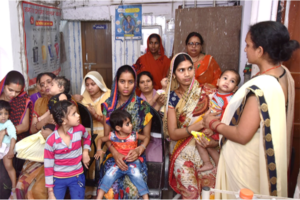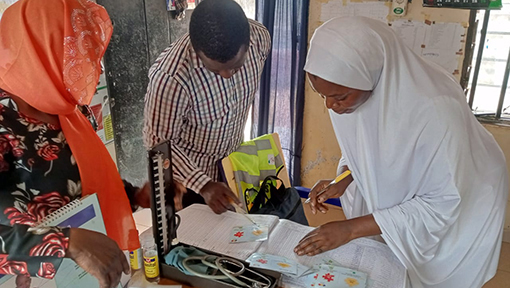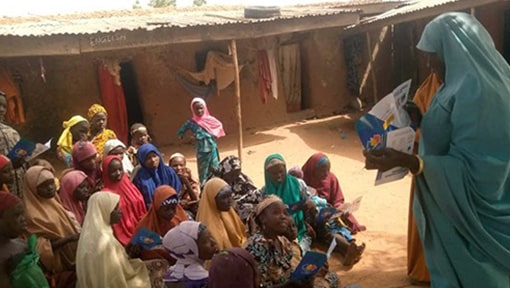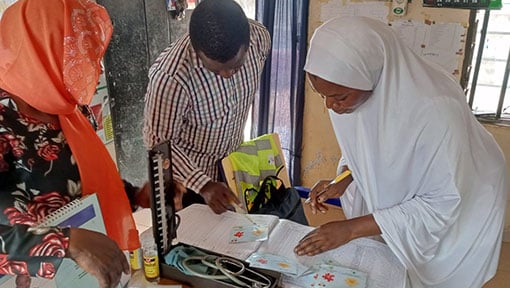TCIHC Helps Accelerate Family Planning Services for Allahabad’s First-Time Parents
Contributors: Vivek Malviya, Parul Saxena, Devika Varghese, Mamta Behera and Mukesh Sharma

FDS for First-Time Parents in an Allahabad UPHC.
India’s National Family Health Survey IV (2015-2016) revealed that Uttar Pradesh (UP) had high unmet need for a birth spacing method among married women between the ages of 15-19 (20.4%) and 20-24 (19.1%). The evidence showed that health outcomes for mothers and babies were significantly better if they waited two years between pregnancies. Yet, inequitable gender and cultural norms around fertility and provider bias leads many young married mothers in UP and elsewhere to have closely spaced pregnancies that compromise their health.
With support from The Challenge Initiative for Healthy Cities (TCIHC), the city of Allahabad sought to address this issue with a special Fixed Day Static (FDS)/Family Planning Days (FP days) drive across its 23 urban primary health centers (UPHCs) to more intentionally reach and attract first-time parents between the ages of 15 to 24 years. FP Days are a TCI HCproven approach where quality family planning services are guaranteed on a pre-announced day each week. From December 2018 to March 2019, Allahabad’s Chief Medical Officer (CMO) and Urban Nodal Officer worked with TCIHC to develop a plan to (1) increase the uptake of modern spacing methods among first-time parents – both young mothers and fathers – and (2) help low-performing UPHCs improve their results quickly.
Although every UPHC in Allahabad was activated to provide FDS/FP days, challenges remained, including shortages of trained service providers. Family planning supplies and equipment were scarce and the Accredited Social Health Activists (ASHAs) were unable to identify, counsel and refer potential family planning clients to facilities during household visits. As a result, the new FDS drive designed to attract more young first-time parents included the four following reinforcing components:
- Better identification and counseling of first-time parents by ASHAs to strengthen demand for services
- Re-orientation/sensitization of service providers to the unique needs of first-time parents
- Expansion of the method mix available at UPHCs to ensure method choice preferred by first-time parents
- Ensuring family planning supplies for long-acting reversible methods
Once the CMO approved and the Medical Officers In-Charges (MOICs) agreed, the FDS drive to attract young first-time parents was put into action during the first three weeks of the month in high-performing UPHCs. Based on the experience and learnings from those facilities, an plan was formulated to conduct similar FDS drives in low-performing UPHCs during the last week of the month.
As a first step towards an effective demand generation strategy, ASHAs were coached and encouraged to update the eligible couple section of their Urban Health Index Register (UHIR). This helped ASHAs develop an age and parity list of family planning non-users in their catchment areas. ASHAs then planned household visits to specifically provide tailored messaging and family planning counseling to first-time parents. The tailored messages and counseling took into account the constraints young married women face in deciding whether or not to use a method, specifically a lack of spousal or influential family member’s support and/or insufficient knowledge of contraceptives and common side effects.
Hence, TCIHC coached ASHAS on tailored messages and counseling techniques to be used with the following groups:
- First-time mothers and fathers
- Women 7 to 8 months pregnant or immediately postpartum
- Decision-makers in the family, such as in-laws and parents
Young mothers lack decision-making power at home and they frequently receive little respect in clinical settings. To counter this, MOICs and staff nurses of UPHCs were oriented on providing adolescent-friendly health services (AFHS) following a curriculum developed by Government of India on AFHS. This orientation enabled service providers to provide non-biased counseling and a full choice of contraceptive methods to young mothers.
To ensure the availability of a full range of contraceptive methods at UPHCs, TCIHC advocated for introducing new contraceptives, such as the Antara Injectable. Government officials agreed and the CMO prioritized Antara training for staff nurses at UPHCs and made Antara stock available in all 23 UPHCs. Eighteen MOICs and 30 staff nurses were trained on technical aspects of Antara. Furthermore on FDS days, IUCD insertion kits were distributed from one UPHC to UPHCs that had few or no IUCD kits. This expanded the method choice even further, ensuring availability of the following contraceptive methods: IUCDs, injectables, combined contraceptive pill (OCP), Chhaya-non-hormonal contraceptive pill and condoms.
Results
The FDS drive to attract more young first-time parents was successfully conducted at each UPHC of Allahabad. The drive helped low-performing UPHCs improve their service uptake and gradually all UPHCs in the city were experiencing similar performance results. Comparing last year’s Health Management Information System (HMIS) data for April 2017-March 2018 to this year’s data for April 2018-March 2019, there is a 96% increase in IUCD acceptors, 8% increase in OCP acceptors and 12% increase in condom acceptors in Allahabad (see chart below). Even uptake of the new contraceptive methods were found to be high: 1,589 women received the Antara injectable and 1,326 women received Chhaya pills.

This special FDS drive ensured voluntary contraceptive choice among young first-time parents and expanded their decision-making power, which helped them address their unmet need for family planning and, in turn, protect them from the risk of unintended pregnancies and unsafe abortions. Furthermore, the special FDS drive built the confidence of UPHC staff and ASHAs to continue such efforts, promoting sustainability of the activities and their impact. Based on these learnings, TCIHC plans to reach around 25,218 first-time parents in the five first phase cities of UP – Allahabad, Gorakhpur, Varanasi, Saharanpur & Firozabad – through coaching 1,112 ASHAs and ensuring the availability of the full choice of methods by trained providers 96 government-run UPHCs. A similar strategy will be rolled out in more TCIHC cities in the coming months.






